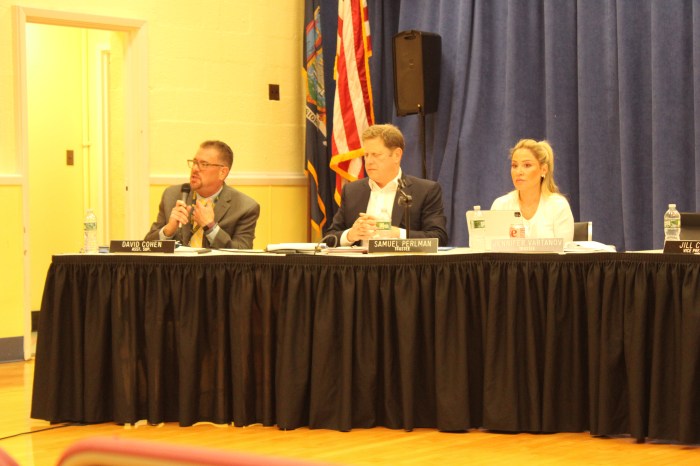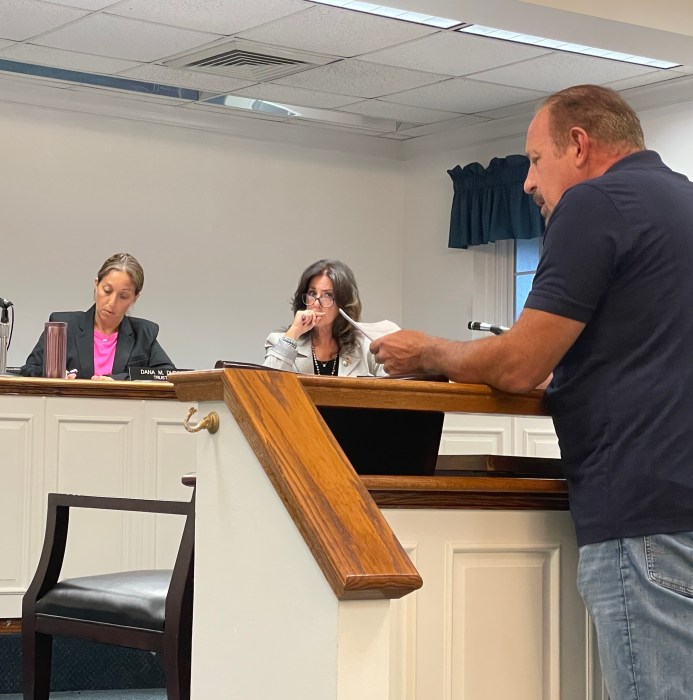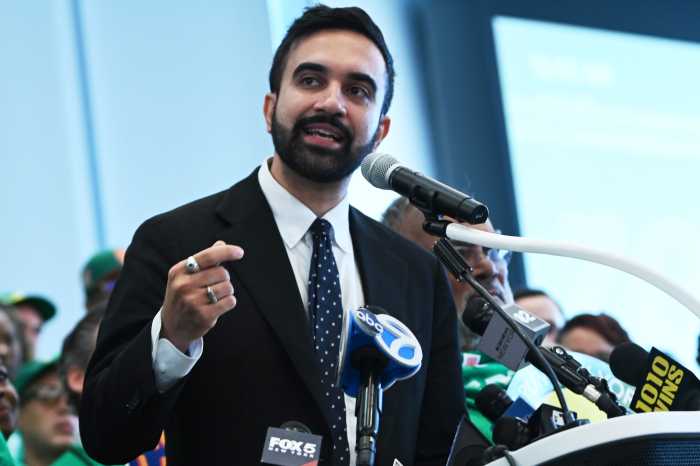Hitting on everything from budgets and taxes to sports, candidates for Oyster Bay-East Norwich Board of Education spoke at the “Meet the Candidates Night” at Oyster Bay High School last week.
At the April 30 forum in the high school auditorium, two current board members, Dr. Michael Castellano and Jim Mattel, and challengers Harriet Dorfman and Jen Romeo, discussed their views on the issues that the district faces and their qualifications for the position.
Moderator Carole Goldfarb, a board member of the League of Women Voters of East Nassau, introduced the candidates. Audience members submitted questions on index cards, which Goldfarb read to the candidates.
One issue discussed vigorously was the tax limit that state law has placed on school districts, limited the percentage of tax levy increase that a school board can normally ask of voters.
Mattel noted the difficulty that the limit involves, though he acknowledged that increasing taxes are a concern.
The others praised the limit. “It forced the district to look at finances,” often turning things upside down for closer examination. Dorfman said.
“Taxes were out of control,” Castellano said. The limit has lowered the extent to which districts can raise taxes. “It makes people understand where the money is going,” because of closer scrutiny needed in light of the taxing limit.
“Expenses were getting out of control,” said Romeo. The tax limit “forced us to sharpen our pencils.”
Candidates also discussed ways of restraining costs in the future, such as re-negotiating contracts.
Dorfman suggested that changing contracts for current employees might be difficult but it might be possible to bring new employees in at a lower salary and with lesser increases.
Romeo also criticized the “step” system, where employees receive pay raises for completing additional educational requirements. “In the private sector we have to keep with continuing education and we don’t receive salary increases for it.” She favors merit raises instead.
Re-negotiating is a good thing, Castellano said, “but you can’t expect the board to renegotiate 30 years” of established practice in salaries and benefits. Rather, boards have to start at whatever points present themselves in the negotiating process.
Mattel spoke of the need to look at things more carefully when negotiating issues as they come up but emphasized in trying to roll back established practices all at once.
On employee health care and other benefits, “I think that is something we really need to look at it,” said Romeo, citing her private sector experience in accounting. Private sector employees are paying more for health and other benefits.
“I think everyone should pay for their health care,” Castellano said, arguing that if everyone paid, everyone would understand the cost which would foster true reform.
“It’s an idea,” Mattel said of Castellano’s proposal, which could lead to fruitful discussion, but did not embrace it. “We have to examine a lot of things.”
Dorfman commented there are different kinds of health insurance policies, such as policies that offer lower premiums but higher deductibles. More options should be examined.
Asked about the importance of academics, arts, and athletics, Romeo called for “all of them,” noting the importance of a well-rounded school program. “I would look to cut other areas first.”
“We need to think differently,” Castellano said, rather than trying to choose among those three priorities.
Mattel noted the central importance of the academic, but insisted on the value of arts and athletics as well. “Often they will keep kids in school.”
Dorfman also agreed on the centrality of academics but lamented the loss of school plays for Vernon Middle School and for the seventh- and eighth-graders at the high school due to budget cuts in past years. She contended that some kids benefit greatly from athletics or arts and suggested that the number of students involved should be a consideration in maintaining certain programs.
As to the biggest challenge facing education today, Romeo cited the expanding technology and keeping students up to date with it.
Castellano pointed to unfunded mandates, state requirements that cost districts money but for which no state money is offered to offset the local cost.
Mattel expressed concern about assessment testing, “for putting tremendous pressure on the schools” to increases test scores.
Dorfman called on the need for districts to band together to lobby the state legislature for help for local districts.
In response to a question about delays in filling vacancies in the school system, such as a supervisor for guidance, Castellano and Mattel did not express serious concerns.
Dorfman disagreed. “I think guidance was hurt” by not having a supervisor and it made it difficult for this year’s senior class in their college applications. She also expressed concern about delays in filling a post for science department chairperson.
Romeo commented on the difficulty in finding candidates for certain position, noting that the size of the district does not allow for the district to pay as much as some districts would. She suggested more should be done to emphasize the positives of being a small district when recruiting candidates.
Following the meeting former board member Dolores Grieco commented on the value of the forum. “It brought to life the strengths and weaknesses of the candidates and can help people decide. With so much at stake, I would think that a larger segment of the community would come out to hear the candidates.”

































